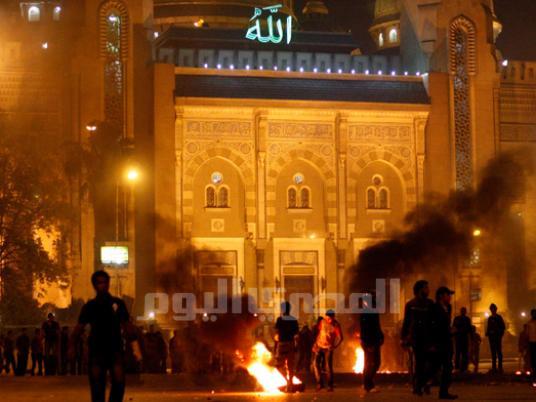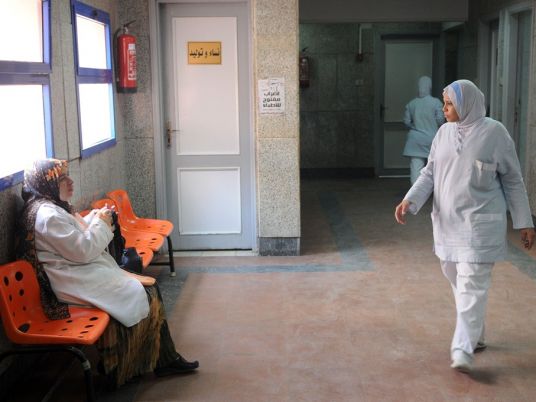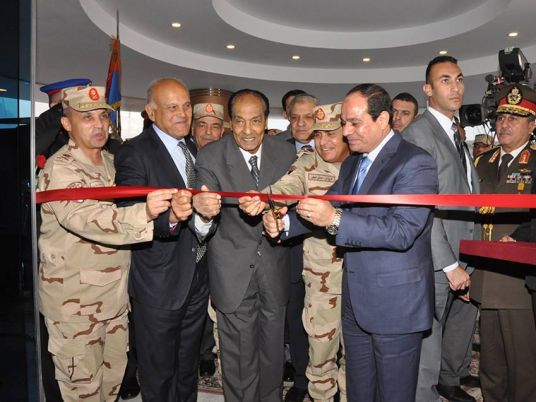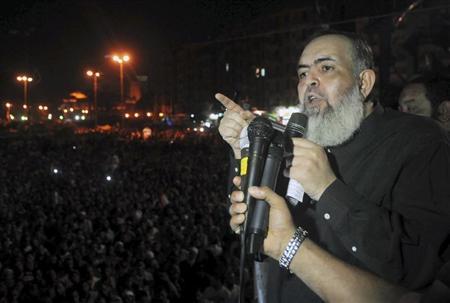
Military and police intervention halted fighting outside the Defense Ministry after at least nine were killed since early Wednesday morning at a sit-in protest in Abbasseya Square.
Military police, Central Security forces and police officers have set up barricades in the neighborhood to separate the protesters and unidentified assailants, Al-Ahram newspaper reported.
A large number of protesters have gathered around the security forces and armored vehicles, chanting: "The people want to bring down the regime," according to the report.
"Eight armored personnel carriers from the military central zone entered the Abbasseya area to disperse the fighting between protesters, and not to disperse the peaceful demonstrators. However, protesters attacked the armed forces. The armed forces have orders to hold their ground," an army statement said, according to Reuters.
Major General Hassan Mourad, the Cairo security chief, said he negotiated with the protesters to end the fighting. According to the report, the clashes and gunshot firing has halted and the unidentified attackers have retreated to the side streets.
Egypt's army said in its statement that it was deploying extra troops only to control clashes and not to disband the demonstration that has been taking place near the Defense Ministry in Abbasseya Square since Friday.
As of Wednesday, the Health Ministry has reported nine dead and 49 injured in the fighting, state-run news agency MENA reported.
Tareq Saeed, a physician at the sit-in's field hospital, told Al-Masry Al-Youm earlier in the day that 11 protesters have been killed. He said two protesters' throats were slit with knives by unidentified assailants who attacked them at Dar al-Shifaa Hospital. A third person was shot dead in the hospital, according to Saeed.
The army said clashes had been contained and a Reuters witness said the situation on the ground had calmed.
Injuries ranged from bruises to wounds from birdshot, according to Khaled al-Khateeb, the ministry's head of the Central Department for Emergency and Critical Care.
After early morning fighting followed by a few hours of tenuous calm, clashes started again around 9 am. Al-Masry Al-Youm reported that armed men attacked with Molotov cocktails and bird shot.
Dozens of activists began marching late Wednesday morning from Fath Mosque in Ramses Square, heading toward Abbasseya Square. The marchers said they would attempt to end the clashes, Al-Masry Al-Youm reported.
Participants in the march chanted, “Down with the military rule,” and threatened to execute military Field Marshal Hussein Tantawi and Chief of Staff Sami Anan.
Eyewitnesses reported the initial attack in the early hours of the day by unknown men, coming from the direction of the nearby Nour Mosque toward the sit-in.
Al-Masry Al-Youm also reported gunfire at the scene and that these unidentified men fired tear gas at the protesters. Protesters responded by hurling stones.
While a field hospital treated urgent injuries, critical cases were transferred to the nearby Ain Shams University Hospital, also known as Demerdash.
The streets leading to the sit-in have been blocked by military police since clashes erupted on Saturday night.
In protest of the attacks, presidential candidate Abdel Moneim Abouel Fotouh halted his campaign on Wednesday. In a statement, he called on the People’s Assembly to “wake up” the interior minister to fulfill his duties and protect the protesters.
Presidential hopeful Mohamed Selim al-Awa said what is happening in Abbasseya Square is an attempt “to place the country in strife or civil war, which is being planned for and managed by groups with malicious interests.”
In a statement on Wednesday, Awa called on the ruling Supreme Council of the Armed Forces to take responsibility for ensuring protesters' safety and arresting thugs and killers.
Freedom and Justice Party candidate Mohamed Morsy also suspended his campaign for two days out of respect for the casualties.
The Muslim Brotherhood's party said it would boycott a meeting planned between the army council and political parties after violence it said signalled an attempt to "obstruct the handover of power" by the July deadline, Reuters reported.
Mohamed ElBaradei, who recently founded the Constitution Party, called on the ruling military council and Cabinet to step down in the aftermath of the clashes.
“The Abbasseya massacre: military council and Cabinet unable to provide security. You failed. Leave. Egypt is being destroyed,” he posted on Twitter.
After an Ain Shams University medical student was killed in the clashes, all on-campus faculties suspended lectures until Thursday. University Vice President Hassan Eissa said each faculty dean had been authorized to make his or her own decision on whether to suspend lectures or postpone exams in case students are at risk. Lectures went on as normal at the university’s off-campus faculties.
The university announced all its hospitals would receive injured students, and denied reports that they had been closed.
Activists voiced concerns about security forces refraining from protecting the sit-in, suggesting their implication in the attack.
The sit-in began Friday night when a group of supporters of former presidential candidate and Salafi preacher Hazem Salah Abu Ismail marched from Tahrir Square to Abbasseya to protest his disqualification from the race.
After initial clashes on Saturday, during which at least one person died and more than 100 were injured, activists joined the Abu Ismail supporters, saying that the sit-in had become unified against the SCAF, from which they demand a swift handover of power.




